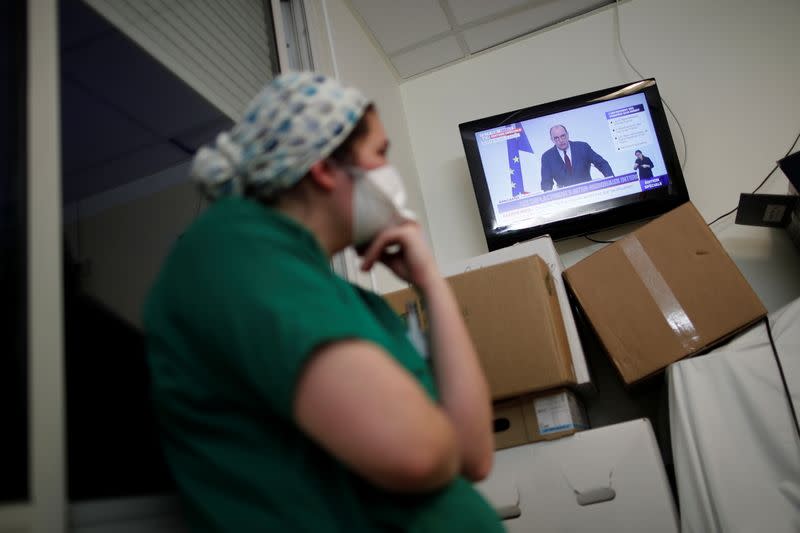By Benoit Van Overstraeten and Richard Lough
PARIS (Reuters) – France imposed a month-long blockade in Paris and parts of the north after a faltering vaccine launch and the spread of highly contagious coronavirus variants forced President Emmanuel Macron to change course.
Since late January, when he challenged calls from scientists and some from his government to block the country, Macron said he would do anything to keep the eurozone’s second largest economy as open as possible.
However, this week he was left with no options as France and other European countries briefly suspended the use of the AstraZenca vaccine.
Its prime minister, Jean Castex, said France is in the grip of a third wave, with the virulent variant first detected in Britain now accounting for about 75% of cases. Intensive care units are under strong pressure, mainly in Paris, where the incidence rate exceeds 400 infections per 100,000 inhabitants.
“The epidemic is getting worse. Our responsibility now is not to let it get out of our control,” Castex said at a news conference.
France reported 35,000 new cases on Thursday and there were more COVID patients in intensive care in Paris than at the peak of the second wave,
Now is the time to tighten restrictions, said Castex.
“Four weeks, the time required for the measures to have sufficient impact. (It is) the time we need to reach a limit on the vaccination of the most vulnerable ”.
The blockades will start from Friday at midnight in the 16 most affected departments in France, which, with the exception of one in the Mediterranean, form a corridor from the port city of Calais, in the north of the English Channel, to the capital.
Barbers, clothing stores and furniture stores will have to close, although bookstores and others that sell essential products may remain open.
Schools will remain open and people will be able to exercise outdoors within a radius of 10 km (6.2 miles) from their homes. Traveling outside the hardest hit areas will not be allowed without a compelling reason.
“Go outside, but not to party with friends,” said the prime minister.
TOO LATE?
Castex said France would resume vaccines with the AstraZeneca vaccine now that the European Medicines Agency has confirmed it was safe.
Seeking to build public confidence in the Anglo-Swedish vaccine, essential for France to reach its targets, Castex said he would get the vaccine on Friday.
“I am confident that the public’s confidence in the vaccine will be restored,” he said, although he acknowledged that it could take some time.
Although Macron has stopped ordering a national blockade, the blockades can be extended to other regions, if necessary, and can still slow the country’s economic recovery.
The Paris region is home to almost a fifth of the population and accounts for 30% of economic activity.
A nationwide night curfew in effect since mid-December remains in effect, although it starts an hour later, at 7pm.
The government has not regretted not having closed before, said Castex.
“It was the right decision in January. We would have an unbearable three-month block. We did well not to.”
Not everyone agrees. In the intensive care unit of a private hospital outside Paris, doctors expressed resignation at having to deal with overworked wards once again.
“We are back here,” said ward chief Abdid Widad.
Health Minister Olivier Veran said that some hospitals would start using monoclonal antibodies, which are synthetically manufactured copies of proteins that fight infections, in certain patients at high risk of progressing to serious illnesses.
(Reporting by Geert De Clercq, Sudip Kar-Gupta, Benoit Van Overstraten, Richard Lough, Matthias Blamont; Additional reporting by Clotaire Achi; Editing by Jonathan Oatis and Alexandra Hudson)
